Health and wellness
Toronto is a physically healthy city, outscoring the rest of the province and country on many indicators of health. Mental well-being is also a critical aspect of quality of life, but in some ways Toronto is not the happiest place — the city has growing mental health challenges. Health is influenced by a broad array of factors, ranging from income, social status, and education to personal health practices, the environment, genetics, and numerous other social determinants. But income is one of the most critical factors associated with health.
- Toronto is physically healthier than the rest of the country and province, and many physical health metrics have been improving over time.
- Hospitalized strokes, heart attacks, and avoidable deaths have all been decreasing significantly over the last decade.
- Despite strong physical health, Toronto is by several measures the least happy city in the country, with our young people the least happy of all.
- Emergency room visits for mental health are increasing extremely rapidly among young adults, as are hospitalizations for eating disorders.
- Opioid deaths and alcohol poisonings are also increasing rapidly.
- Lower income is broadly associated with worse health outcomes across most major indicators available in this chapter.
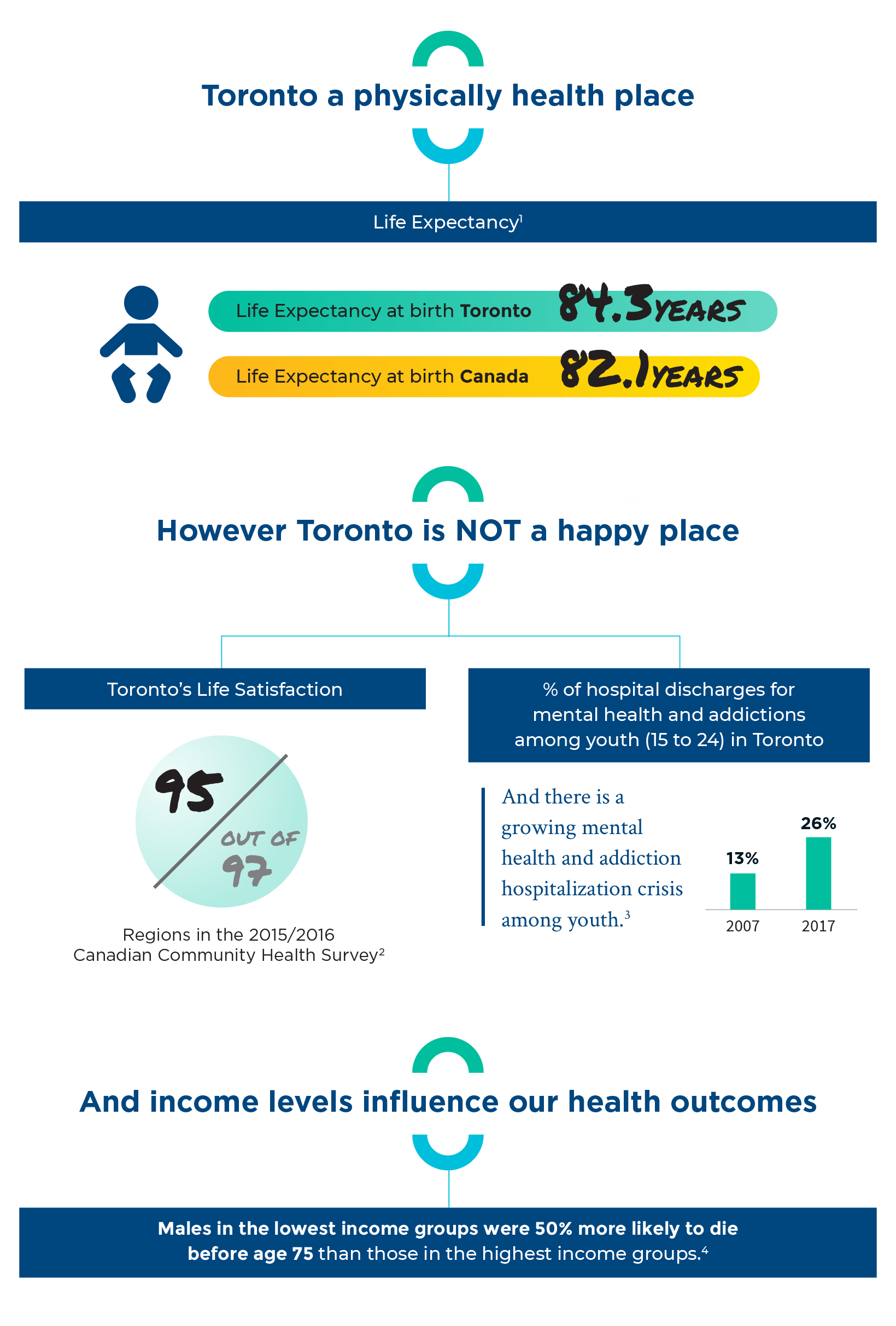
Grassroots Leaders
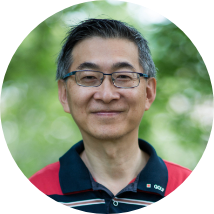
“Even though we live in an underserved community, or what some people might call an undesirable neighbourhood, we want to be recognized. We are not sitting here doing nothing. But we need support, and funding, to keep our work ongoing.”
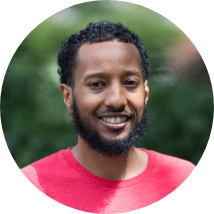
“ There is a genuine opportunity for philanthropists to invest in underfunded and underserved communities in Toronto. I can only imagine how much residents’ lives would improve if they had options, instead of having no choice but to work with what they have.”

“ Philanthropists can support economic development through impact investments. Give someone an interest-free loan to start a small business. They’re called microloans — we used to do it in my village.”
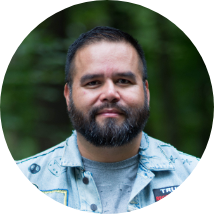
“ If you want to work in a good way with Indigenous people through Truth and Reconciliation, listen to our stories. Our stories will help you understand the depth and complexity of all the barriers we face.”
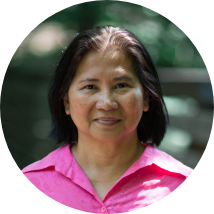
“ Community volunteers and grassroots leaders — these are the people who know their communities and can find out what’s needed. These people also have to live. They need compensation for this work. If you want to make change in communities, use these people. Hire
them to do the work for the community.”
</section >
Community Organizations
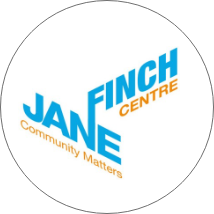
Jane/Finch Centre’s Financial Empowerment and Problem Solving Program supports overlooked populations file taxes and apply for benefits. It helped residents secure more than $7.3million in benefits last year.
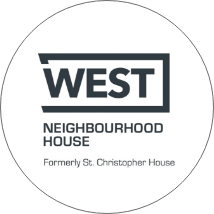
West Neighbourhood House provides collaborative financial empowerment initiatives including free counselling, assistance applying to benefits, tax-filing support, debt-management strategies, and financial advice to low-income residents. 75% of participants with debt have implemented debt-management strategies from the assistance of the program.
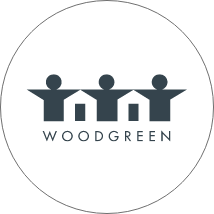
WoodGreen is one of the largest affordable social housing providers in the city, currently serving more than 1,000 families in 12 affordable housing buildings and is working to find new ways to raise capital for new units.
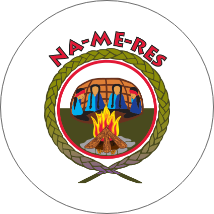
Na-Me-Res helps “Aboriginal men in Toronto lead healthy, self-determined lives.” It has three residences that span an array of housing needs including temporary shelter (69 beds); and transitional housing (25 beds), while also offering cultural programing and skill development; and long-term housing to those who have completed their other programs and are ready for long-term housing at low rent.
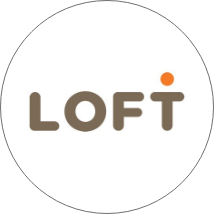
The BLOOM program, run under LOFT Community Services, is a unique network in Toronto providing space for transgendered individuals to find stability during their transition time.
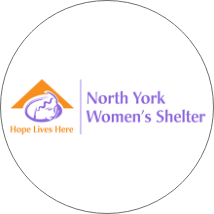
North York Women’s Shelter supports women and children to build lives free from violence by providing nonjudgmental safe shelter, advocacy, and a range of initiatives and services, including 24-hour crisis support and wrap-around services. The shelter has served more than 11,000 women and children since its founding in 1984.
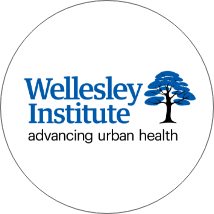
Wellesley Institute noted in its 2015 report Low Wages, No Benefits that a lack of medical benefits can play a key role in creating health inequities. Three of the main recommendations of the report are that dental benefits should be extended to more low income families, prescription drugs should be available to all, and access to vision
care should be a greater priority.
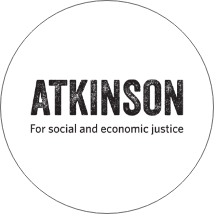
Atkinson Foundation, a leading voice in the field of decent work, published a 2019 report announcing it has made employment insurance improvements a top part of its agenda. The report highlighted the lack of coverage for many precarious workers and inadequate benefits for those who need to draw on them. Experts have also highlighted the need for higher
employment standards.
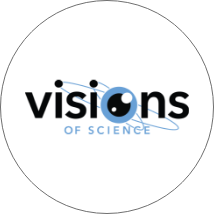
Visions of Science is a Toronto-based organization working to advance the educational achievements and positive development of youth from low-income and marginalized communities through meaningful engagement in STEM fields. It offers hands-on experiments and activities through its clubs and regular workshop offerings.
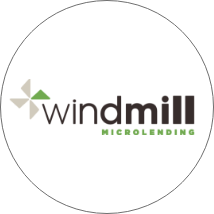
Windmill Microlending, a charitable organization that provides microloans of up to $10,000 to help skilled immigrants and refugees continue their careers by helping pay for supports needed to access Canadian credentials.
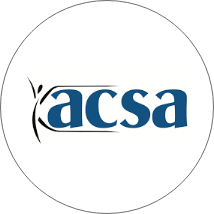
Agincourt Community Services Association, has recently launched its Health Resiliency Project. This project is working with 10 resident leaders to provide them with critical skills, so they can help provide fitness, nutrition, and other support to 14 different community groups to implement health and wellness initiatives throughout the Steeles-L’Amoreaux neighbourhood.
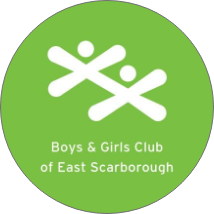
Boys and Girls Club of East Scarborough, is one organization working to help increase both sports and arts access in these and other nearby neighbourhoods. The club supports more than 5,000 children and youth across 19 locations and provides before- and after-school programs, including sports and recreation, and arts.
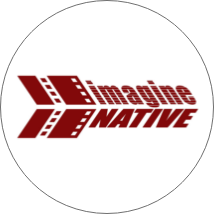
imagineNATIVE, runs the world’s largest Indigenous film festival, creating a greater understanding of Indigenous peoples and cultures through contemporary Indigenous-made
media art. imagineNATIVE commits to paying industry-standard artist fees for all initiatives and asks all co-presenters to ensure that fees are paid, even when they are not requested.
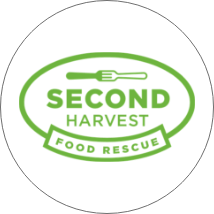
Second Harvest, is Canada’s largest food-rescue organization. It is implementing new initiatives to further reduce food waste and lower greenhouse gas emissions, while also providing more than 34,000 meals per day to more than 370 front-line organizations.
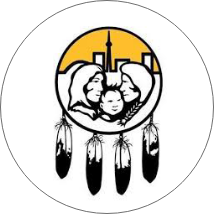
Native Child and Family Services of Toronto, is a multi-service Indigenous agency that offers diverse services to the Indigenous community in Toronto, including child-welfare services,
transitional housing, skills training, counselling, youth recreation and camps, and early childhood development programs.
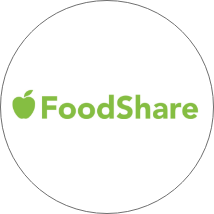
FoodShare, is a Toronto-based charity working to bring food to local neighbourhoods through two initiatives that help deal with transit poverty. The Good Food Market is run in 40 local areas across the city, offering below-market rates for vegetables and fruits in markets with
restricted access to healthy food. The Mobile Good Food Truck services another 10 stops throughout the city.
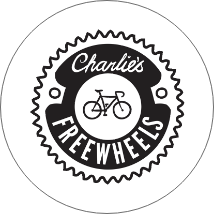
Charlie’s Freewheels, works to increase the number of active commuters by running bicycle-based programming to build leadership skills, while also teaching bicycle mechanics, offering weekly group rides through the city, and hosting field trips.
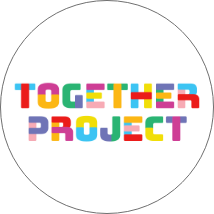
Together Project has several initiatives to help refugees build social connections and inclusion as they settle in Canada. Among these initiatives is its Welcome Group program, where volunteer groups of five or more Canadians are matched with government-assisted refugees to help build relationships and navigate the complexities of settling in Canada.
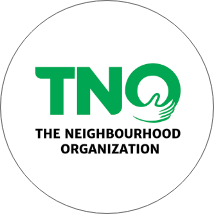
The Neighbourhood Organization serves several Neighbourhood Improvement Areas with among the highest concentrations of newcomers in the city, including Thorncliffe Park, Flemingdon Park, St. James Town, and Crescent Town. In the organization’s last fiscal year, it served more than 25,000 newcomers through its settlement services, more than 2,000 people through employment services, and more than 20,000 youth via its youth centre, among countless more programs.
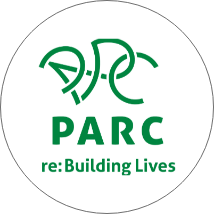
Parkdale Activity-Recreation Centre Women’s Leadership Group is working to address the lack of available mental health supports through a series of monthly community-led drop-in sessions for peer-to-peer mental health training and resources. The group is working to build alternatives to medical and police interventions by providing everyday citizens with the tools to support their friends and family members.
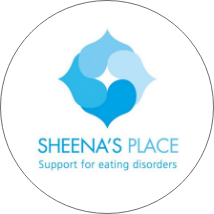
Sheena’s Place works on issues concerning eating disorders. It offers free professionally facilitated peer-support group programs that run for 10 or more weeks, with 15 to 20 participants learning coping skills and other tools to improve their health. More than 95% of participants say they learned a new coping strategy, skill, or insight from attending the program.
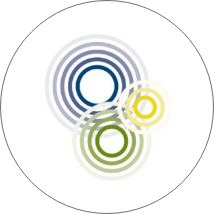
JUMP Math works to improve math literacy. It provides resources and training to teachers, as well as tools that can be used by parents at home. JUMP Math characterizes its approach to math as one of guided discovery, which includes instruction and discovery-based learning, with the philosophy that all students are capable of learning math.
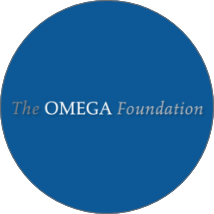
Smartsaver.org is a tool run by the Omega Foundation, working to help people access RESP benefits. This online tool allows for a quick application process for an RESP.
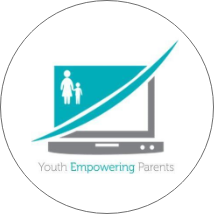
Youth Empowering Parents helps address the problem of adult literacy through pairing adults with youth volunteers who speak the same language. The charity trains youth to deliver one-on-one tutoring in English and computer skills. Youth Empowering Parents provides training to youth to effectively teach skills, empowering youth to be service providers, not just service receivers. So far, the charity has seen 30,000 volunteer hours contributed by youth, with more than 2,000 participants from four countries.
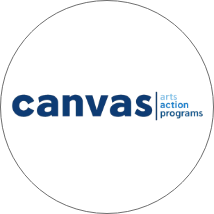
CANVAS Arts was founded to prevent sexual violence, homophobia, and transphobia through the delivery of interactive, arts-inspired education on consent, gender equity, and LGBTQ2S+ inclusion in schools, summer camps, and communities in Ontario. The C-Word is one of its initiatives that offers an innovative 2.5-hour program that provides a safe space for youth to have conversations on consent and rape culture, helping them to build concrete skills to develop safe, positive relationships.
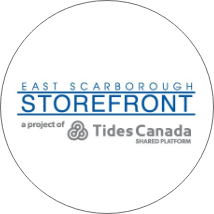
East Scarborough Storefront is a place-based community organization that facilitates collective effort from residents, government, and social organizations to improve outcomes for children and youth in the community. It has recently launched a “Diversity, Dialogue & Disruption” initiative in the Kingston-Galloway-Orton Park neighbourhood, building three types of dialogue in their community: peer to peer, youth to police, and broad community discussions about
key priorities.
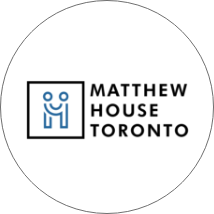
Matthew House Refugee Reception Services’s Mock Refugee Hearing Program provides safe shelter and food for newly arrived refugees who would otherwise be homeless, a problem that has grown by more than 60% in the last five years. The program works with volunteer lawyers, retired immigration adjudicators and others to ensure that refugee claimants understand the system and are properly prepared by performing simulations of the hearing in a realistic environment.”
</section >
Connect your Philanthropy

2a. Statistics Canada, “Canadian Community Health Survey: Public Use Microdata File, 2015/2016.”
2b. In the Canadian Community Health Survey Public Use Microdata File, some regions are aggregated in different ways than information available on Statistics Canada’s website.
3. Canadian Institute for Health Information, “Mental Health and Addictions Hospitalizations in Canada, by Health Region” (CIHI, 2019).
4. Van Ingen et al., “The Unequal City 2015: Income and Health Inequities in Toronto.”






